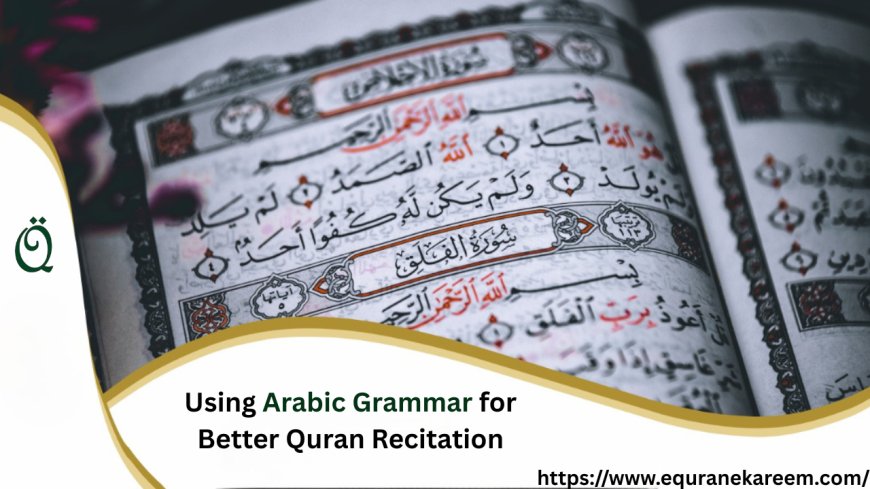Using Arabic Grammar for Better Quran Recitation
Discover how learning Arabic grammar enhances Quran recitation by improving pronunciation, understanding, and Tajweed. Master Nahw and Sarf for deeper spiritual connection.

Understanding the Quran goes beyond memorization and pronunciation, it requires a deep connection with the Arabic grammar that underpins its divine structure. The grammar of the Arabic language plays a crucial role in improving Quran recitation (Tilawah) by enabling readers to grasp the linguistic beauty, correct meanings, and intonation that reflect Allahs words accurately.
Importance of Grammar in Quran Recitation
Grammar plays a vital role in ensuring accurate Quran recitation by guiding correct pronunciation and word usage. It helps prevent errors that could alter the meaning of verses. Understanding grammar also deepens comprehension, making recitation more meaningful and spiritually impactful.
Deepening Understanding of the Quran
The Quran was revealed in classical Arabic, a language rich in syntax and morphology. By learning grammar, known as Nahw (syntax) and Sarf (morphology), students can decode complex sentence structures and appreciate the subtleties of meaning. This allows for a more accurate and reflective recitation through an Arabic Grammar Course.
Improving Pronunciation and Fluency
Grammar of Arabic teaches correct word forms and endings, which are essential in Tajweed rules. Many errors in recitation come from grammatical misunderstandings, especially in case endings (i'rab). Grammar aids in pronouncing verses correctly and respectfully.
Aligning with Divine Message
Reciting the Quran without grammar awareness may lead to altering meanings unintentionally. Grammatical knowledge helps maintain the integrity of the recited verses, reflecting their true intent.
Core Grammar Concepts That Enhance Recitation
Mastering core grammar concepts like i'rab (case endings), verb patterns, and sentence structure enhances clarity and precision in Quran recitation. These rules ensure correct pronunciation and preserve the intended meanings of the verses.
Understanding I'rab (Grammatical Case Endings)
Arabic words change endings based on their position in a sentence. Recognizing Irab helps in applying correct pronunciation during recitation. For example:
-
Nominative (Raf'): Subject of a sentence
-
Accusative (Nasb): Object of a verb
-
Genitive (Jarr): After prepositions or in possessive phrases
Identifying Sentence Types (Jumlah Ismiyyah & Jumlah Filiyyah)
-
Jumlah Ismiyyah (Nominal sentence): Starts with a noun
-
Jumlah Filiyyah (Verbal sentence): Starts with a verb
Knowing the structure improves intonation and flow during reading, making the meaning clearer.
Using Verb Forms and Patterns (Sarf)
Arabic verbs follow specific patterns, each reflecting tense, voice, and intensity. Understanding these patterns helps readers anticipate changes in meaning and pronunciation.
Learning Arabic Grammar for Quran Recitation
Learning grammar of Arabic equips students with the tools to read the Quran accurately and understand its linguistic depth. It bridges the gap between memorization and true comprehension.
Take a Quran Grammar Course
Enrolling in a Grammar Course of Arabic for Quran helps learners build step-by-step fluency. Many online platforms offer beginner to advanced levels focused on Quranic application.
Use Grammar-Focused Tafsir
Study Quranic Tafsir (exegesis) books that emphasize grammar, such as Tafsir al-Jalalayn or Al-Kashani. They help bridge grammar rules with spiritual meanings.
Practice with Mushaf Al-Tajweed
This version of the Quran is color-coded for grammatical rules and Tajweed application, reinforcing learning visually.
How Grammar Affects Tajweed and Tilawah
Grammar supports proper application of Tajweed by clarifying vowel endings and sentence flow. It ensures each verse is recited with precision, meaning, and fluency.
Enhancing Proper Articulation
Tajweed relies on precision in pronunciation. Grammar clarifies the vowel markings (harakat) and proper stress on syllables, preventing major mistakes (la?n).
Reducing Errors in Waqf (Stopping)
Knowing grammar helps in deciding where to pause or continue a verse. Misplaced stops can change the meaning entirely, grammar guides correct waqf placement.
Boosting Confidence in Recitation
When students understand why a word is pronounced a certain way, they gain more confidence and fluency in reciting longer surahs.
Spiritual Benefits of Grammar-Enhanced Recitation
-
Mindful Recitation: Knowing grammatical rules fosters a more focused and intentional approach.
-
Deeper Reflection (Tadabbur): Grammar unveils layers of meaning, enabling deeper spiritual contemplation.
-
Enhanced Connection with Allah: Accurate recitation improves sincerity (ikhlas) and humility (khushu) in worship.
Conclusion
Mastering grammar is more than an academic exercise, its a path to beautiful and accurate Quran recitation. By understanding how words function within verses, learners can elevate their Tilawah to reflect the Qur'ans divine nature more faithfully. Whether youre a beginner or advanced reciter, incorporating grammar into your Quranic journey will transform both your linguistic skills and your spiritual connection.
FAQs
Q1: Do I need to be fluent in Arabic to recite the Quran properly?
No, but learning basic grammar (Nahw and Sarf) significantly improves pronunciation, meaning, and Tajweed.
Q2: Whats the difference between Tajweed and grammar?
Tajweed is the science of recitation, while grammar explains the structure and role of words in Arabic. Both work together for accurate recitation.
Q3: How long does it take to learn enough grammar for better recitation?
With regular study, learners can grasp core grammar within 36 months. Progress depends on consistency and resources used.
Q4: Can children benefit from grammar in Quran recitation?
Yes, many child-friendly programs integrate basic grammar into Quran learning to promote early understanding and fluency.
Q5: Whats the best resource to start learning this course for the Quran?
Start with an Arabic grammar course focused on Quranic Arabic or beginner Nahw books like Ajrumiyyah with a teacher.




































